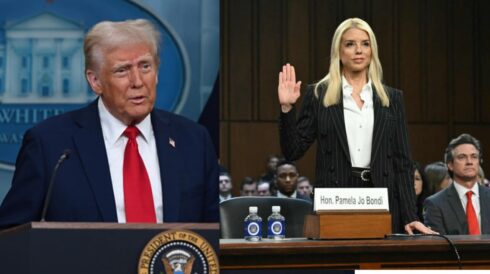Attorney General Pam Bondi launched a scathing rebuke against a Department of Justice attorney who failed to defend a key Trump-era deportation case, prompting swift disciplinary action. During a court hearing last Friday, federal attorney Erez Reuveni, a 15-year veteran of the DOJ’s immigration division, openly admitted that the deportation of Salvadorian national Kilmar Abrego Garcia was a mistake.
Reuveni, who was tasked with defending the government’s removal of Garcia—an alleged MS-13 gang member—stunned the courtroom when he told Judge Paula Xinis, “I’m also frustrated that I have no answers for you for a lot of these questions.” Instead of asserting the administration’s position, Reuveni acknowledged that Garcia “should not have been removed,” derailing the Justice Department’s defense and triggering an immediate backlash.
The mishandled argument has since drawn outrage from Pam Bondi, who appeared on Fox News Sunday to clarify her stance. “Our client in this matter is Homeland Security,” she said. “Reuveni did not argue for it; he should not have taken the case.” Bondi confirmed that Reuveni has been placed on administrative leave following his courtroom remarks.
Pam Bondi Defends Disciplinary Action and DOJ Expectations
Attorney General Pam Bondi made it clear during her media appearances that there is no room in the DOJ for attorneys unwilling to vigorously defend their clients, regardless of personal opinions or doubts. She referenced a February 3, 2025, memo she issued upon taking office that required DOJ attorneys to “zealously advance, protect, and defend” the positions of their agency clients.
“You have to vigorously argue on behalf of your clients,” Bondi said. “This is no different than a defense attorney suddenly confessing their client is guilty. That’s not advocacy—it’s malpractice.”
Pam Bondi’s memo, shared with opitanglobamedia also warned of consequences for any DOJ employee who fails to uphold this standard. “Any attorney who fails to abide by this direction will face consequences,” she stated, signaling a zero-tolerance policy for dissent within the department’s legal ranks.
The Deportation Error: What Happened to Kilmar Abrego Garcia?
Kilmar Abrego Garcia, 29, a Salvadorian national with an American wife and son, was deported last month despite living in Maryland. The Trump administration initially defended his removal on the grounds that Garcia was an active MS-13 gang member, as asserted by Immigration and Customs Enforcement (ICE).
However, Garcia’s attorneys disputed those claims, and it later emerged that the deportation may have been carried out in error. The administration’s legal team later conceded in court filings that the removal had been a mistake. “Through administrative error, Abrego-Garcia was removed from the United States to El Salvador,” the Trump team admitted. They also claimed the removal was executed in “good faith” based on existing documents and allegations regarding gang involvement.
Garcia was transferred to CECOT, El Salvador’s infamous supermax prison, on March 15. His legal status is now the subject of ongoing litigation in U.S. federal court, raising complex questions about due process and the government’s accountability.
Judge Orders Reversal Amid Government Pushback
Following the DOJ’s admission of error, Judge Paula Xinis issued a direct order for the Trump administration to facilitate Garcia’s return to the United States by Monday. However, the administration has resisted the order, seeking relief from a higher court by arguing it lacks the authority to extract Garcia from a foreign correctional facility.
Judge Xinis expressed frustration over the government’s inability to make a coherent legal argument supporting Garcia’s continued detention in El Salvador. With the Department of Justice having failed to justify the deportation or provide clear legal grounding for Garcia’s removal, the court has found itself navigating uncharted legal waters.
As of now, no clear path exists for returning Garcia to U.S. soil, especially as Salvadorian authorities have not cooperated with repatriation efforts. The situation has underscored the legal complications of immigration enforcement when intergovernmental coordination and procedural integrity break down.
Wider Implications for DOJ Culture Under Pam Bondi
Pam Bondi’s strong public condemnation of Reuveni appears intended as a signal to other DOJ attorneys: alignment with the administration’s policies is mandatory. “We’ll see what happens,” Bondi remarked cryptically when asked if further disciplinary measures are expected. Internally, the message is being interpreted as a warning shot to any DOJ staff reluctant to enforce Trump-era immigration priorities.
Bondi’s leadership marks a return to hardline legal enforcement at the DOJ, particularly on immigration. Her push for strict internal compliance and courtroom discipline is already reshaping departmental culture, drawing both praise from Trump loyalists and criticism from civil liberties advocates.
As the legal battle surrounding Garcia unfolds, Bondi’s handling of the controversy may set a precedent for how dissenting DOJ attorneys are treated moving forward—especially in cases where policy and conscience collide














